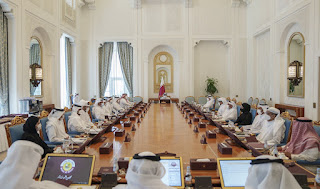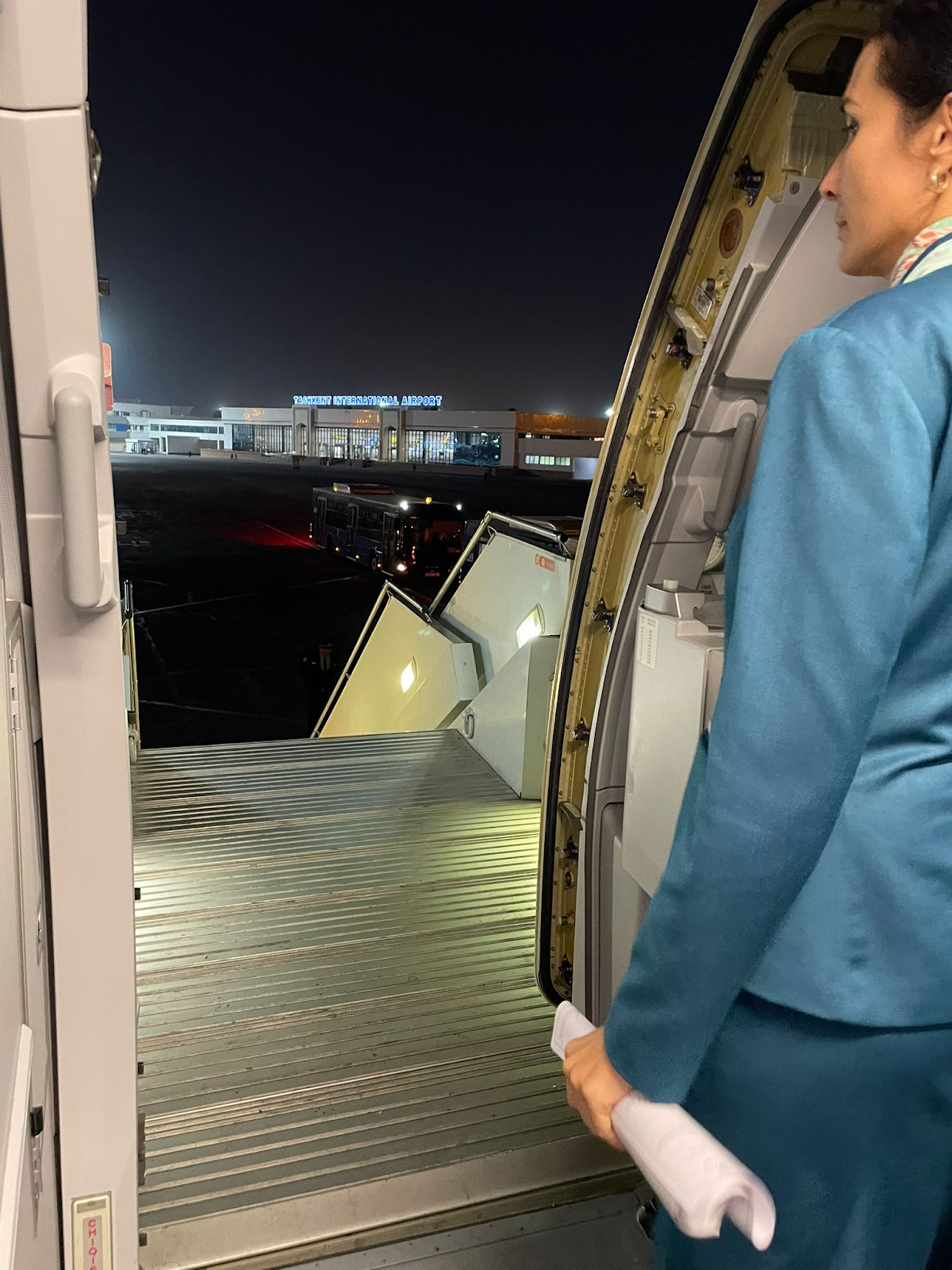Monday, 31 October 2022
a modern silk route 7
Sunday, 30 October 2022
a modern silk route 6
a modern silk route 5
Saturday, 29 October 2022
a different kind of route
a modern silk route 4
Thursday, 27 October 2022
A modern silk route 3
The history of Qatar spans from its first duration of human occupation to its formation as a modern state. Human occupation of Qatar dates back to 50,000 years ago, and Stone Age encampments and tools have been unearthed in the peninsula.
The peninsula fell under the domain of several different empires during its early years of settlement, from 300BC to 600AD, including the Seleucid, the Parthians and the Sasanians, until Muhammad sent an envoy to a Persian ruler in Eastern Arabia named Munzir ibn Sawa Al Tamimi in 628 and requested that he and his people accept Islam. Munzir obliged his request and most Arab tribes in Qatar converted to Islam. Over the proceeding centuries, Qatar was a site of contention between the Wahhabi of Najd and the Al Khalifa.
Bahrain and mainland Qatar had been seized by the Portuguese in 1521. After the Portuguese claimed control, they constructed a series of fortresses along the Arabian Coast. The Portuguese focused on creating a commercial empire in Eastern Arabia, and exported gold, silver, silks, cloves, amber, horses and pearls. The population submitted voluntarily to the rule of the Ottomans in 1550, preferring them to the Portuguese.
The Ottomans expanded their empire into Eastern Arabia in 1871, withdrawing from the area in 1915 after the beginning of WWI.
In 1916, Qatar became a British protectorate and Abdullah Al-Thani signed a treaty stipulating that he could only cede territory to the British in return for protection from all aggression by sea and support in case of a land attack. A 1934 treaty granted more extensive protection. In 1935, a 75-year oil concession was granted to Qatar Energy and high-quality oil was discovered in 1940 in Dukhan. During the 1950s and 1960s, increasing oil revenues brought prosperity, rapid immigration, substantial social progress and the beginnings of the country's modern history.
Qatar declared its independence on 1 September 1971 and became an independent state on 3 September.
Fast forward 51 years, here I am in Qatar discussing with the Prime Minister and his cabinet their National Development Strategy what the state would be like in 2030 (their 60th year of independence) and none of the elements are trivial.
Today it is one of the wealthiest state in the world, in absolute and relative (GDP/capita) terms, thanks largely to its significant gas reserves. However, in today’s climate-challenged world and more critically, dwindling reserves, they need to diversify their economy amidst increasingly competitive nations in the gulf: all aiming to attract investors and talents to grow their economy.
We had to grapple with trade offs between economic development (growth and diversification targets) vs the social cohesion implications. We had to help define values of the nation: what to preserve vs what must be further developed based on their national identity and history.
While I was deep in debate with the supreme committee, D was on a private city and water tour of the capital. With her insightful mind, she understood the country right away. She noticed that much has been built, very quickly but are largely empty. They are creatively designed but few truly reflected the heritage and natural beauty of the land (except the desert rose inspired national museum of qatar).
Also, with all these new build, Qatar could have gotten the architects to lead the way with sustainable buildings but instead too many steel (from china) and glass (from US) buildings re erected which is also completely impractical for a place so easily covered in sand. Her summary of "fast and empty" encapsulates the monumental task Qatar has ahead for the coming years to reinvent itself.
a modern silk route 2
Monday, 24 October 2022
A modern silk route 1
Wednesday, 19 October 2022
All grown up
M has a blog and she titled it Growing!, yup complete with exclamation mark.
She writes of her growth and growing pains and once in a blue moon marks her growth with some ink.
Monday, 17 October 2022
Uzbekistan, again
I am on my way to Uzbekistan again. I was here in 2017 and had an epiphany about the potential of the region. It inspired me to plan a family trip in May 2019, and followed that up with a business trip May this year. The leisure trip was with M and D (J had to go back to serve his internship obligations) and what a glorious trip it is across the Fergana Valley and into historical trading posts of Samarkand and Bukhara. My trip earlier this year was all business and I met with the DPM amd Minister of Finance amongst others and promptly got a project sold!
I am heading there again for the official opening of the office where the Minister will grace. Am flying there after a Global Public Sector meeting from London on Uzbekistan Airways flight HY204 to Tashkent. Not surprisingly it was delayed for nearly an hour because the flight had arrived late by 30 minutes. I know the math doesn’t add up but out of a busy airport like Heathrow, turnaround times is slower and then you lose your air traffic slots.
London remains one of the capitals of the world but I wonder for how much longer. Infrastructure has not kept paced with the population that driving anywhere within the city (esp. during rush hour takes an hour). No. 10 is now a revolving door with PMs coming and going, mostly because of party infighting. Then there is the low brow distaste that is served on public media and I was appalled with an episode of Naked Attraction I chance upon while surfing the channels in my hotel room. More importantly, the economy is anaemic and the pound has taken a beating as the markets did not appreciate the growth policy the (new) government has proposed. In fact, just before I flew out of London, the Chancellor of the Exchequer was dismissed: a scapegoat for the times.
On the other hand, the former Soviet Union state of Uzbekistan has leaders who care about the development of their country. No doubt, some level of corruption exists, but unlike in many parts of the world, the leaders I met here are not out to manipulate the population for their own gains. Here, they are keen to learn of the successes and failures of others.
When I was first here 5 years ago, I took a
quick private day trip to Chimgan countryside and encountered people who looked
like me and especially an old stall keeper who resembled my grandmother. The
Hakka people are said to have originated from the north of China where we had
lived as nomadic groups in the Steppes that spanned all across Central Asia.
Maybe that is why I felt a certain kinship with this people and are back here
again for the fourth time in five years and no doubt there will be more trips
to come, perhaps with J in tow as well.
The Uzbekistan Airways flight is really basic. I am in business class, so the seats are bigger but that;s about it. There is no inflight entertainment, the pilots take longer to get to cruising altitude (or to let the passengers know that they are there) and the cabin crew generally just huddle in the galley than walking the aisles to serve the passengers. Reminds me of what it was like 30 years ago in Vietnam. Vietnam has certainly come a long way since then and these central Asia states are indeed the next frontier.
There is, however, some charm to this “old world” operations. I spent the parts of my flight reading. A Paul Theroux travel book no less (and this one is about his travels from Cairo to Capetown which is something I would like to do). And now midway through the flight, writing. Normally, I would have been on to my second movie on the inflight entertainment, a mindless activity that one would promptly forget unlike the more engaging reading and writing I am doing now.
So, there is a silver lining in every circumstance, and in the case of Uzbekistan, it may well be a golden lining! When I was here five years ago, I even encouraged the team to author a report and tell the world the potential of this region. Now, I am back here advising the government to live up to the potential.













